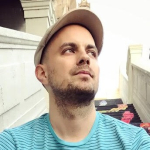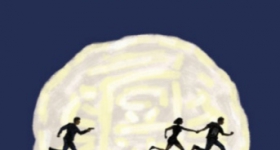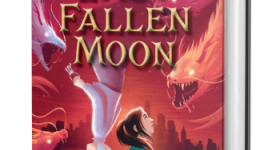It was an idyllic spring afternoon when my mom beat the shit out of me, the zeppelin inside my heart bursting into flames. Before I stepped inside the house, the treetops were drenched in untranslatable komorebi amid the rolling green hills of yesterday. Dandelion clocks disintegrated in a puff. Posters of paint-smudged fishing towns hung from living room walls of houses I passed on my bike. The fuzzy navel sunset spilled onto the parchment horizon. When my mom wailed on my body like a disobedient dog in the kitchen, I lost faith in the entire world. My adolescence became scented in its own fragility. The ground around me slowly disintegrated. I lay in a daze that night, daydreaming on my bed about the butterflies that had hovered over my bike like protective spirits. I craved a magic eraser for every mistake I’d made and every rule I didn’t understand. I cried until the darkness shushed me to sleep.
My mom had told me not to play with Blain because he was weird, an argument that felt sophistical. As a hapa family, we were always treated as racial spies collecting intelligence for both sides of our racial identity unless we played white. I was biking around Traverse City, a small hamlet in Northern Michigan where sakura groves exploded with pink hues like touched-up impressionistic stills, tart cherries and morel mushrooms were sold in cardboard crates on the corner and the sunlight dripped down the foliage like exquisite nectar. I remember pedaling through a cloud of pulsating monarchs. They flexed their wings on my handlebars like Icarian parables. That’s when I noticed Blain standing in front of his house like an inscrutable omen. We played until the galvanized scent of sautéed ground beef and broiled cheese stuck to the air like sensory ornamentation. I biked home, cloaked in the fading mango sunshine, my face baptized in flower pollen and birdsong.
When I walked into the kitchen, my mom scrutinized me. — Where you been?
— Nowhere, I said.
— Did you play with him after I told you not to?
— No, I said, confused.
— Tell me the truth! she yelled.
— I didn’t, I pleaded.
— You little liar, she screamed.
My mom grabbed a yardstick from the kitchen closet and struck me on the backside with all her force. The house was hauntingly empty except for this sound: wack, wack, wack. Tears streamed down my cheeks. I hurled apologies at the air with a quivering voice, but she hit me again and again with incanted strength until the yardstick splintered into two pieces. In my mind, the broken weapon was clemency. The clumsy providence of a lazy god. But then she grabbed a three-foot clothespin from the closet and started wailing on me again. In syncopated sobs, I begged her to stop. I pleaded. I whimpered in contrition. I apologized for my existence. I promised never to play with Blain again. I promised not to be myself if it would protect me from myself. Nothing got through.
The trauma of that day lingered in my mind for years afterwards. After all, trauma isn’t just cellular pain. The indefatigable memory of trauma is itself a survival strategy. By not allowing me to forget the things that destroyed me, my trauma tried to protect what it refused to erase. I have never located the boundary separating pain from trauma. I don’t know if we overcome trauma, or merely coexist with it. I just know that kids used to point and laugh at my Miami Vice sport coat in sixth grade and tell me I looked gay. I just know the random violence of neighborhood boys punching my pretty hapa face for made-up reasons, coming home to a dark and silent house on the hill that signified I was alone and the abuse of gravity breaking apart my daydreams with every bike wipeout and playground felony. The psychological arithmetic of childhood pain never disappeared because my survival depended on not forgetting the numbers.
Like all perpetrators of violence, my mom was intransigently unmoved by my suffering as she beat me into submission. The only sound inside the vacant house was this: wack, wack, wack. The next day there were indigo bruises covering my ass and thighs like divots in a ravaged lawn. When I looked at myself in the mirror, my relationship with my family that had failed to protect me or notice my temporary limp had changed radically. I was the only one who knew about my secret secession, the only person in my house who dreamt of running away to Tokyo or Paris or Interlochen to find safety and community. What my mom did that day she never did again, but I’ve remembered it for the rest of my life because of the way that pain became the dominatrix of my memory: restraints to my rage, paddle to my oblivion, my boyhood in handcuffs, my hope tickled by the popper, my safety words smacked hard by the whip.
When my parents got divorced, I had to choose a parent. I picked my dad, not because we were close or because he was affectionate with me or because he showed any interest in me, but for the simple reason that he’d never hurt me. He’d never left his signature on my body. Pain requires intervention, and he lived on the sidelines of every conflict. I picked my dad because pain is always an overdeveloped photograph of the psyche. I was just a 12-year-old kid trying to survive in a world that kept changing its rules and then falling apart on me like a window display of Styrofoam. Our dad may never have consoled us, asked us how we were doing, expressed explicit affection or displayed solicitude or empathy for us during the divorce, but at least he’d never written us letters saying we’d killed him because we were selfish sons as our mom had done the day we’d stopped by her apartment on Center Road to take her out to dinner for Mother’s Day. We picked our dad because the atomic weight of our pain was enormous and invisible and neither parent acknowledged it, but only one parent intentionally caused it whenever she felt betrayed or ignored. Neither parent acknowledged how much the divorce blew up our lives in the house on the hill, but only one parent tried to perform normalcy even in the face of bankruptcy and familial detonation, an illusion I craved during every catastrophe. Shock prevents victims from grieving for themselves in the beginning. I think it also freezes their hearts to other people’s suffering. This is how my mom ignored the trauma she’d caused me in the kitchen, convinced that her own trauma was an alibi for the damage she caused me. But pain is a morphology of the self and no one knew this better than my mom. Her pain changed her and her pain changed me.
I was broken for a very long time after she beat me and I broke at inexplicable moments afterwards as a teenager. Sometimes, I wished someone in my family would have cared or at least acknowledged how fucked up it was to make me attend four high schools in four years. Sometimes, I wish my dad or anyone in our extended family had asked Wick and me if we were okay, if we needed anything, if someone was abusing us.
Because I was broken, I learned to glue myself back together through trial and error like a stepped-on, torn-up, crinkled origami swan. This is how I survived:
1. I found refuge in obāchan: she took me to piano lessons, baked TV dinners for me, sang along with me when I played “Sakura” on her piano, watched me play video games in the arcade and played gin rummy with me at the kitchen table before I took a nap on her couch.
2. I found refuge in my body: I biked around town and pretended I was in the Tour de France. I took baths religiously. I ran through thunderstorms in the summer. I went sledding in our backyard during sunsets and winter blizzards. I played Chopin nocturnes in the dark. I discovered pleasure in puberty, the thrill and the charge of every movie-theater kiss.
3. I found refuge in performance: I listened to Pet Shop Boys and the Breakin’ soundtrack on the stereo and pretended I was a dancer in ’80s music videos. I pretended I was a French exchange student visiting America for the first time. I made up stories about robot guardian angels from the manga my parents brought back from Japan.
4. I found refuge in desire: I crushed on flirty girls in the hallways, at pop-and-potato-chip parties, under the shimmering disco strobes of the roller rink, strutting down Front Street in a new outfit of denim and plaid and sitting on the beach all alone. I freestyled fake Shakespearean sonnets at parties before I kissed girls.
5. I found refuge in storytelling: I was a cultural spy, a double agent and a secret ninja. These hidden identities helped me feel like I controlled my own alienation and belonged to an underground society of badass revolutionaries who sought their own marginalization as a means of maintaining their secrecy.
6. I wrote unfinished handbooks about a society of ninjas that was supposed to protect mixed-race, hapa and Japanese American kids like me from bullies.
7. I created talk shows with a tape recorder in which I interviewed mushy apples.
8. I survived the way only a kid could, through unbridled imagination and unjustified hope. I frequently invented alternate destinies inside my head as an emotional counterbalance to the real world.
Victimology has no first cause, no first victim. It’s a tragic part of the human discourse. To be human is ultimately to participate in the discourse and the dynamic of trauma. My mom victimized her sons because she was a victim herself. When my white grandfather came home drunk, his pores gushing with stale whisky, he molested my mom, hit my obāchan and sometimes raped her. He forbade his Japanese wife and his hapa daughter from speaking Japanese in their own home even though Japanese was their first language, and they lived in Yokohama. He shipped my mom off to Buckley, Michigan, where she lived with her xenophobic aunt who locked her in a basement and forced her to clean the house like a contemporary hapa fairytale. My mom washed dishes, cleaned the house and cried herself to sleep while her white cousins stared at her and made fun of her beautiful hapa face and called her a Jap. My obāchan sewed clothes for my mom and sent her care packages from Japan along with money and letters, which my aunt promptly gave away to her own daughters. She pocketed the money. This is a circuitous way of saying that victims replicate their victimization in others because at first they don’t see themselves as victims and then later because they see only themselves as victims. I make no excuses for my mom’s intermittent abuse. I only place her trauma in context, situating it within a continuum of violence, assault and dehumanization that will outlive all of us. We cannot erase it. We can only leave bite marks with our crooked teeth.
::
The cyclicity of pain is often a cold and plummeting fall that girls cushion with their braids and warm with smoldering hearts, a broken place that men rebuild over and over again with giant cranes, that women prop onto their shoulders and throw back into the sky, that boys hurl rocks at ever since the days of Goliath and the age of fox spirits. In my best moments, I know how to help others with their pain by simply listening, entering into their emotional space, holding their hands, itemizing everything that pain steals from them, loving them for their vulnerability and leakage and forgiving them for their brokenness and shedding, but I have no solutions to my own pain and trauma. I only know how to stab the monster with the sharp edge of my sentences and hurl words at its jugular like shuriken. When everything is said and done, I only know how to hold hands with the blade. Despite the insight I have about my own pain, at heart I’m just a punch-drunk karaoke singer who knows the lyrics to every love song but can’t sing them out loud when the mic is live on stage. The truth is that I don’t want other people to know how deep the pain goes inside me, how much I crave the balm of the melody or how afraid I am of being seen and dismissed. If they see me, then they will see right through my gossamer heart. They will know that I’m still in love with this disastrous world, even after all this time.










Comments